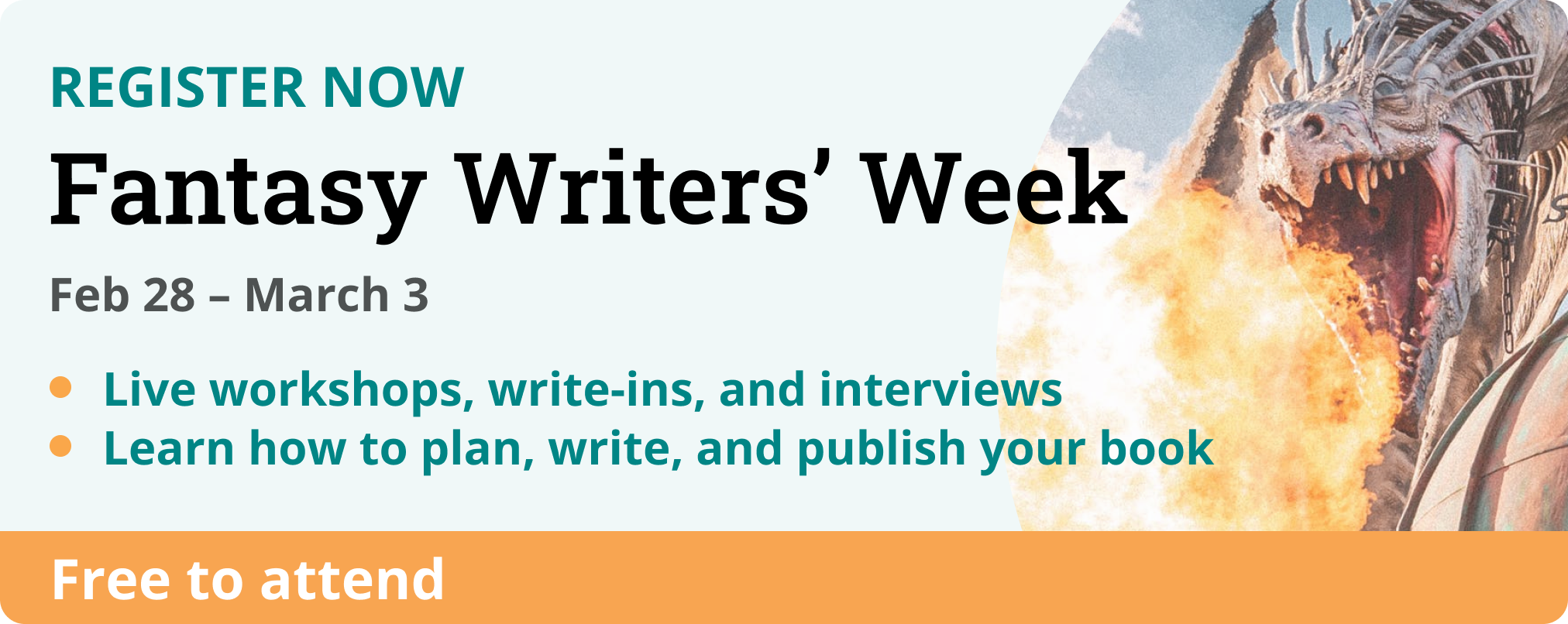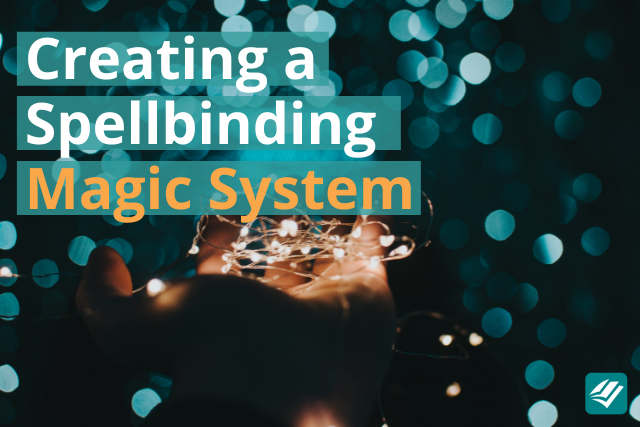
A wizard casts a powerful spell. An alchemist transmutes lead into gold. A genie grants three wishes—with a twist.
This is one of the most exciting things about writing fantasy: getting to design your own magic system.
If you’re new to the genre, it’s easy to fall back on tropes you’ve seen before. As a quick example, just think about how many movies and books reuse the theme of elemental magic—fire, water, earth, and air.
There’s nothing wrong with using classic tropes, but if you want to stand out in the crowded world of fantasy, you’ll need to learn how to use them in an innovative and unique way.
This article will help you write a magic system for your fictional world that readers will remember long after they’ve turned the last page.
Find Out How the Pros Create Magic Systems at Fantasy Writers' Week
- Four free days of live events, just for fantasy writers
- Write, plan, and learn with us live with workshops, write-ins, and interviews
- Hear from bestselling authors and educators like V.E. Schwab and Tomi Adeyemi
On to the article!
Hard Magic Systems vs. Soft Magic Systems
Before you build your magic system, you’ll need to decide what kind of system you need to create for your story, because different magic serves different purposes.
There are two types of magic systems: hard magic systems and soft magic systems. These terms, originally coined by Brandon Sanderson, are widely used by fantasy fiction writers today.
In general, hard magic should solve problems for your protagonists, while soft magic should cause problems for your protagonists.
Let’s take a closer look at what these terms mean.
What’s a Hard Magic System?
A hard magic system is magic with a clear set of rules. In any scenario, the reader should have some sense of what magic can and can’t do in the fictional world.
Why is it important for a hard magic system to have rules? Well, your protagonists will use magic to solve some of their problems. And there’s nothing less exciting than a story where the protagonists can escape from any danger just by wishing it away.
Imagine if Harry Potter could vanquish Voldemort in the first chapter just by making up a spell called antagonist defeatium. Not very exciting, right?
Since there are clear rules in the Harry Potter series, we don’t wonder why Harry doesn’t just make up an all-powerful spell. Each time Harry, Ron, and Hermione find themselves in danger, they can only escape that danger using magic that we’ve already seen them learn.
In the first book, Ron doesn’t know any troll-slaying spells, so he uses the Levitating Spell to knock out a mountain troll instead. In the fourth book, Harry doesn’t know any flying spells, so he uses the Summoning Spell to call his broomstick.
In both these cases, it’s their clever problem-solving that saves them, not the power of the magic itself.
Hard magic systems provide interesting limitations that allow your protagonist to solve problems using their own wits, not raw magical power.
The key traits of a hard magic system are outlined in the graphic below.
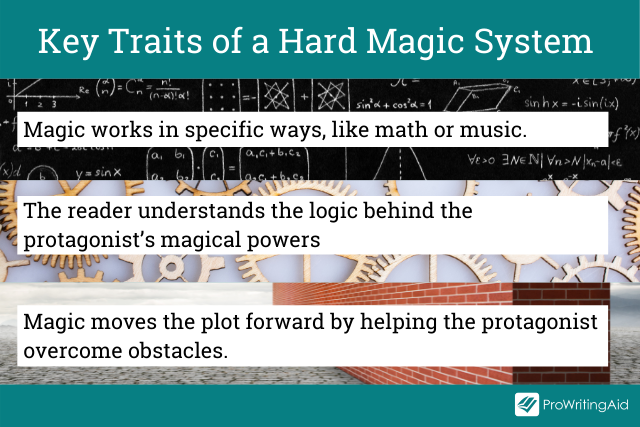
Some well-known examples of hard magic systems:
In Fullmetal Alchemist by Hiromu Arakawa, magic is like chemistry. All magic is governed strictly by the Law of Equivalent Exchange, which says that “in order to obtain something, something else of equal value must be lost.” When the protagonists need to create something, the readers understand exactly what materials they need to sacrifice.
In The Bartimaeus Trilogy by Jonathan Stroud, magic is like law. Magicians summon magical spirits, like djinni, and command them to do their bidding. The protagonist’s wording must be airtight, because the djinni will look for loopholes.
In the Harry Potter series by J.K. Rowling, wand magic is like language. Witches and wizards need to learn each spell individually and practice speaking their enchantments in exactly the right way in order to achieve the intended results.
What’s a Soft Magic System?
Soft magic systems are the opposite of hard magic systems: they don’t need to have a clearly defined set of rules.
As the reader, you may never truly understand what can and can’t be accomplished with magic, but that’s okay—you don’t feel you need to in order to enjoy the story.
Soft magic is vague, undefined, and enigmatic. The purpose of soft magic is simply to create a feeling of adventure, and wonder.
As a general rule, antagonists can use soft magic to solve problems, even though protagonists should only use hard magic. This is because an all-powerful antagonist makes the story more exciting and perilous, while an all-powerful protagonist achieves the opposite effect.
The key traits of a soft magic system are outlined in the graphic below.
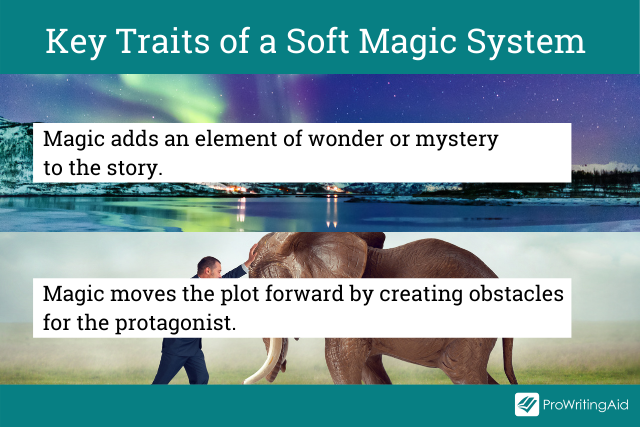
Some well-known examples of soft magic systems:
In The Lord of the Rings by J.R.R. Tolkien, we never find out exactly what Gandalf can and can’t do with magic. However, not understanding Gandalf’s magic doesn’t detract from the story, because the protagonists have to undergo most of their journey without Gandalf’s help.
In the Studio Ghibli film Spirited Away, the entire spirit world operates under a soft magic system, from the magical bathhouse customers to the killer paper airplanes. Most of the time, magic hurts the protagonist rather than helping her, so the fact that we never understand the rules makes it even easier to empathize with her.
In The Kingkiller Chronicle by Patrick Rothfuss, the magical discipline of Naming is a soft magic system. We learn the limits of the hard magic systems in the series, such as Sympathy and Sygaldry, while we never learn the limits of Naming. The protagonist doesn’t understand Naming well either, so we never expect him to solve major plot problems using soft magic.
Which Type of Magic System Do You Need for Your Story?
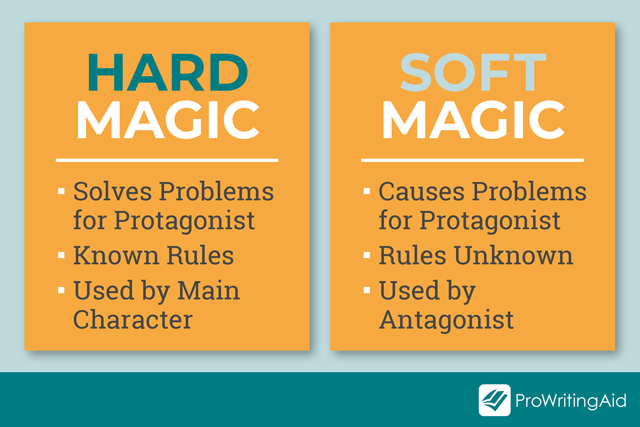
Hard vs. soft magic is a spectrum, not a binary. Most magic systems fall somewhere in the middle of the spectrum.
For example, you can create a magic system that has very clear rules for your protagonist but only vague rules for your antagonist. The Harry Potter series is a splendid example—we know what spells Harry can do, while we never find out the exact bounds of Voldemort’s magical abilities.
When you’re deciding which type of magic system to use, ask yourself:
Do you want magic to solve conflict for your protagonist (hard magic) or to create conflict for your protagonist (soft magic)?
Who will use magic: the protagonist (hard magic), or the antagonist / side characters (soft magic)?
Do you prefer planning things out logically (hard magic), or going with your gut (soft magic)?
Once you’ve figured out what kind of system you need, it’s time to start building!
Building Your Own Hard Magic System
If you want to create a hard magic system, you need to create a specific logic that serves as the foundation for the entire system.
To build this logic, start by thinking about three things: the effects, sources, and costs of magic. All three should work together to create the magic system.
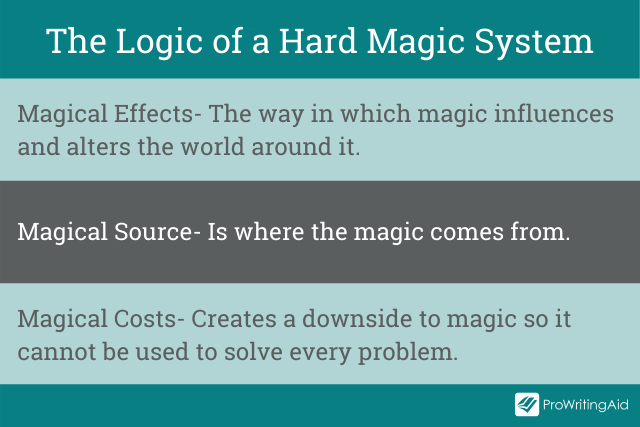
What Are the Effects of Magic?
The term “magical effects” refers to the ways in which magic influences and alters the world around it.
Here are some examples of magical effects:
In The Broken Earth Trilogy by N.J. Jemisin, orogenes can manipulate the earth. Specific effects include causing earthquakes, preventing earthquakes, and turning people to stone.
In the Old Kingdom series by Garth Nix, necromancers can control the dead using bells and music. Specific effects include waking the dead, sending dead spirits back into the afterlife, and binding the dead to follow their commands.
In The Farseer Trilogy by Robin Hobb, practitioners of the Skill can communicate to each other telepathically. Specific effects include communicating with others, working together as a group, and riding inside the minds of others.
Grab a sheet of paper and brainstorm a list of magical effects that fascinate you: ones you’ve already seen before, or ones you come up with from scratch.
Remember that specific effects are better than broad effects. For example, if your characters can telekinetically control objects, your story will be more interesting if each character can only control a specific type of object, rather than being able to control anything they want.
Ask yourself what effects will help your protagonists solve the problems presented in your plot, and what effects will be fun to write about.
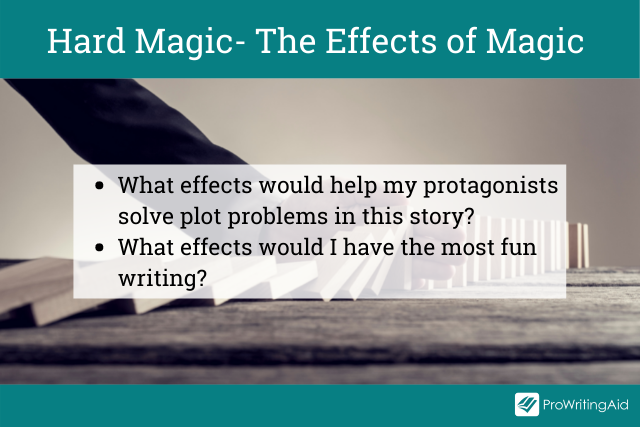
Magical effects will make a bigger impact on your readers if you use all five senses. You can use our ProWritingAid Sensory Report to make sure you’re including sight, sound, touch, taste, and smell in your magic system.
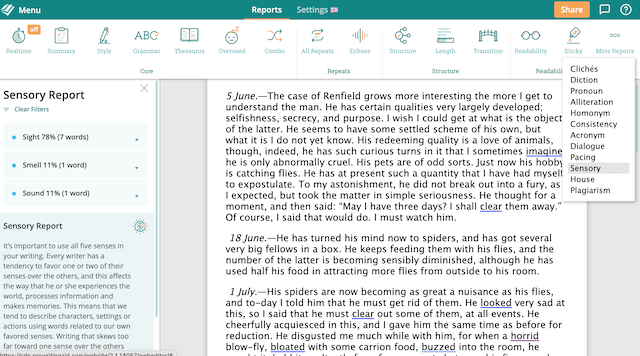
What Are the Sources of Magic?
A magical source is where the magic comes from. Usually, magic comes from magic users, the gods, magical creatures, or a specific substance.
Here are some examples of magical sources:
In Percy Jackson & The Olympians by Rick Riordan, magic comes from the gods. Demigods have partial powers, which they inherit from their Olympian parents.
In The Bartimaeus Trilogy by Jonathan Stroud, magic comes from magical spirits like djinn. Magicians have no power of their own except through the spirits they command.
In Mistborn by Brandon Sanderson, magic comes from specific metals, like copper, tin, or aluminum. Mistings have to ingest and “burn” these metals in order to use their powers.
Once again, grab a sheet of paper—this time to brainstorm magical sources.
In some cases, the answer might already be obvious given the world your story is set in. If there are important mines in your world, for example, it might make sense for magic to come from metals. If there are powerful gods, it might make more sense for magic to come from the divine power of the pantheon.
Ask yourself what sources will work well for the magical effects you want to use, and what sources will work well within the world you have created.
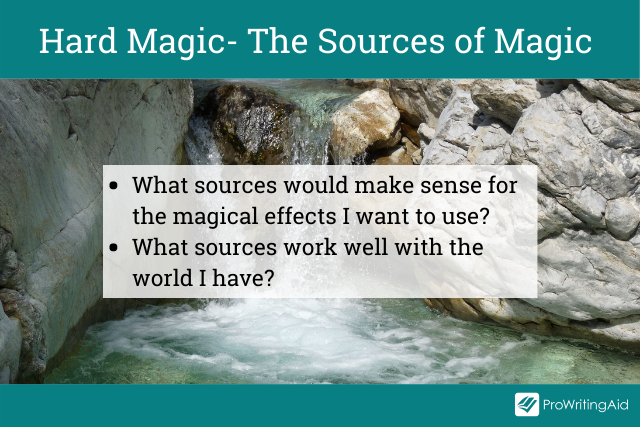
What Are the Costs of Magic?
A common mistake when building magic systems is to forget to include costs.
If there are no downsides to using magic, your protagonists might soon become overpowered, able to solve any problem with the wave of a wand. That cheapens the story and makes it less exciting to read.
By making sure magic has costs, you can force your protagonists to be clever and resourceful when they solve problems.
Here are some examples of magical costs:
In The Locked Tomb trilogy by Tamsyn Muir, using magic exhausts necromancers, and causes some of them to bleed. Overusing their magic can cause them physical harm.
In Sorcery of Thorns by Margaret Rogerson, magicians owe a demon years of their life in exchange for magic. Each spell shortens their lifespan by an unknown number of years.
In the Shadow and Bone series by Leigh Bardugo, all Grisha have to serve the King. Even though there are no physical costs to using magic, being Grisha means losing their freedom to pursue the life they wanted.
When you’re brainstorming magical costs, try to be creative. The costs of magic can be physical, societal, or even financial.
Ask yourself how you can prevent the magic-wielders in your story from becoming too powerful, and what costs would post interesting challenges for your characters.
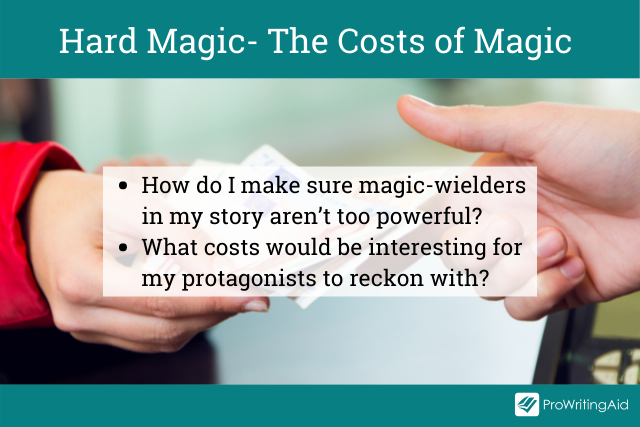
How Do the Effects, Sources, and Costs of Magic Fit Together?
Now that you’ve brainstormed the effects, sources, and causes of magic, you can put all three together! It’s time to create a system of rules that will feel cohesive and logical.
Look at your three lists and try to find patterns and connections. Try to group together similar effects, sources, and costs.
Ask yourself:
What are the interconnections between the ideas I’ve come up with?
Are there any overarching themes?
Building Your Own Soft Magic System
If you want to create a soft magic system, I have some good news: you don’t need to come up with a set of systematic rules, or even an underlying logic.
However, you still need to put in the work to create a unique and compelling system that will serve the needs of your story. These are some questions you should ask when you brainstorm.
How Will the Magic System Create a Sense of Mystery and Awe?
The primary purpose of a soft magic system is to contribute to the atmosphere of your story. Many horror movies use soft magic systems to create a sense of fear and dread, while children’s books might use soft magic systems to create a sense of excitement and adventure.
Ask yourself:
What atmosphere will my story have? Is it dark and scary? Is it light and full of wonder?
What kinds of magical concepts and images would contribute to that atmosphere?
Who Will Use Magic in Your Story?
Because soft magic is often used by characters other than the protagonist, you should think about who the wielders will be. Many soft magic systems include magical creatures: centaurs, mermaids, nine-tailed foxes—the possibilities here are endless.
Ask yourself if your antagonist will be a magic-wielder, and if there will be magical creatures in your story.
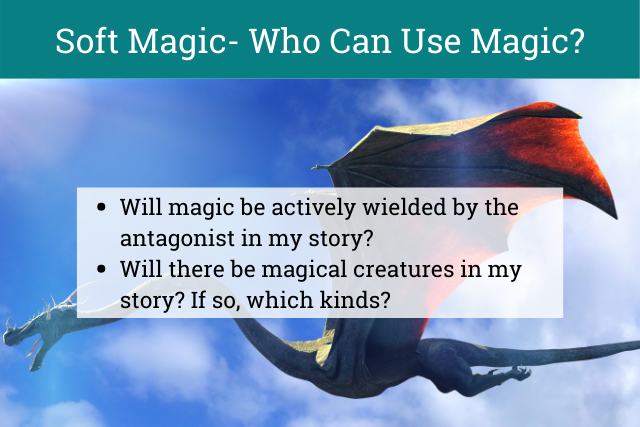
How Will Magic Cause Problems for Your Protagonists?
The key thing to remember when creating a soft magic system is that it should create problems for your protagonists, rather than solving problems for them. If you follow this rule, readers will appreciate the awe and mystery of the magic without feeling like it cheapens the story.
Ask yourself what kind of problems magic will cause your protagonists, and whether your antagonist will use magic to achieve their goals.
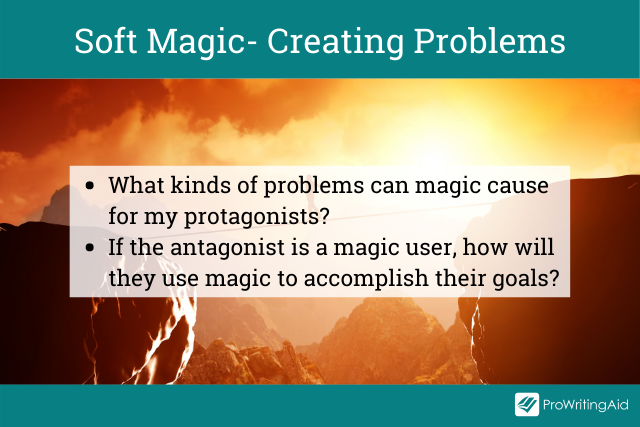
Now you have all the tools you need to create your own magic system. The more unique you make it, the more memorable your book will be for readers.
What are your favorite magic systems? Tell us about them in the comments below.
If you love writing fantasy, this is the event for you.
- Learn from bestselling authors and educators in live sessions
- Master outlining, writing, editing, publishing and more
- Meet like-minded fantasy writers in networking events

